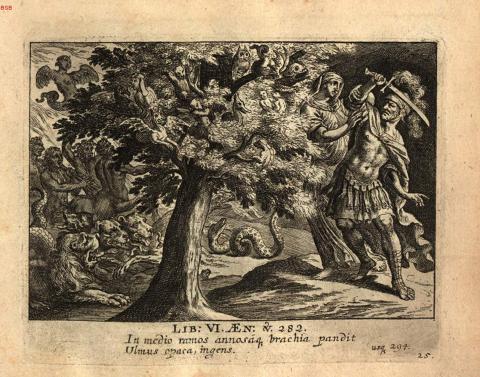CORE VOCABULARY
medium, iī, n.: medium, iī, n., the middle, midst, 2.218; the intervening space, 6.131; ad medium, in the middle of the body, 12.273; in medium, into the midst, in public; before them, 5.401; for the common weal, 11.335.
rāmus, ī, m.: a branch, bough, 4.485, et al.; limb, 8.318; wreath, 5.71.
annōsus, a, um: adj. (annus), full of years; aged, old, 4.441; hoary, 6.282.
bracchium, iī, n.: strictly, the forearm from the hand to the elbow; in general, the arm, 2.792, et al.; (fig.), limb, branch, of a tree, 6.282; sail-yard, 5.829; of walls, 3.535.
pandō, pandī, passus or pānsus, 3, a.: to spread out or open, 7.641; unfurl, 3.520; extend, expose, 6.740; break through, open, 2.234; unbind, dishevel, 1.480; (fig.), disclose, declare, explain, reveal, 3.179.
ulmus, ī, f.: an elm tree, elm, 6.283.
opācus, a, um: (adj.), shady, 6.283; obscure, dark, 3.619; subst., opāca, ōrum, n., partitive; opāca viārum, dark pathways, roads, 6.633.
somnium, iī, n.: a dream, 5.840; personified, 6.283. (somnus)
folium, iī, n.: a leaf, 1.175.
haereō, haesī, haesus, 2, n.: to stick; foll. by dat., or by abl. w. or without a prep.; hang, cling, adhere, cling to, 1.476, et al.; stop, stand fixed, 6.559; halt, 11.699; adhere to as companion, 10.780; stick to in the chase, 12.754; persist, 2.654; dwell, 4.4; pause, hesitate, 3.597; be fixed or decreed, 4.614.
mōnstrum, ī, n.: the thing which warns; an omen, a portent, 3.26; supernatural token, sign, 12.246; a prodigy, marvel, wonder, terror, 3.583; monster, 2.245. (moneō)
Centaurus, ī, m.: 1. A Centaur, a fabulous monster, with a human head and neck and the body of a horse, 6.286. 2. The name of a ship in the fleet of Aeneas (fem.), 5.122.
foris, is, f.: a door; often in the pl. with reference to double doors, 1.505; door or entrance. (rel. to θύρα)
stabulō, 1, n.: to be in a stall or standing-place; to stay, harbor, dwell, 6.286. (stabulum)
Scylla, ae, f.: 1. A dangerous rock on the Italian side of the Straits of Messana opposite Charybdis, 3.420; personified as a monster, half woman and half fish, 3.424. 2. The name of one of the ships of Aeneas, 5.122.
bifōrmis, is: adj. (bis and fōrma), of twofold shape or form, two-formed, 6.25.
centumgeminus, a, um: (adj.), hundredfold; of the hundred- (or many-) handed Briareus, 6.287.
Briareus (trisyll.), eī, m.: Briareus, or Aegaeon, one of the three Uranids, or sons of Uranus, giant monsters with a hundred (i.e. very many) hands, 6.287.
bēlua, ae, f.: a beast, large, monstrous, or hideous, 6.287.
Lerna, ae, f.: Lerna, a marshy forest near Argos, where the Lernaean hydra was slain by Hercules, 6.287, et al.
horrendum: (adv.), frightfully, fearfully, 6.288. (horreō)
strīdeō, 2, n., and strīdō, strīdī, 3: to produce a grating or shrill sound; to creak, 1.449; gurgle, 4.689; rustle, 1.397; whiz, roar, 1.102; hiss, 8.420; twang, 5.502.
armō, āvī, ātus, 1, a.: to equip with arms; arm, equip, 2.395, et al.; fit out, make ready, prepare, 4.299; (fig.), imbue, charge, 9.773; p., armātus, a, um, armed, charged, 12.857; subst., armātī, ōrum, m., armed men, warriors, 2.485. (arma)
Chimaera, ae, f.: 1. A monster, said to have infested Lycia, having the head of a lion, the body of a goat, and the tail of a dragon, and breathing out fire, 6.288. 2. The name of one of the ships of Aeneas, 5.118.
Gorgō, onis: the common name of the three daughters of Phorcus, terrible on account of their snaky hair; especially, the head of the Gorgon on the shield of Minerva, 2.616.
Harpȳia (trisyll.), ae, f.: a Harpy, a fabled monster, half woman and half bird, 3.112, et al.
tricorpor, oris: adj. (trēs and corpus), three-bodied, 6.289.
corripiō, ripuī, reptus, 3, a.: to take completely or eagerly; to grasp, snatch, seize, catch, 1.45; hurry away, 1.100; tear away; hasten on, take, 1.418; raise quickly, rouse, 4.572; sē corripere, to hasten away, 6.472. (com- and rapiō)
subitus, a, um: having come up suddenly; unexpected, sudden, 2.692; suddenly, 3.225. (subeō)
trepidus, a, um: (adj.), agitated, uneasy, disturbed, trembling, affrighted, 2.380; excited, tumultuous, 11.300; confused, in disorder, 10.283; alarmed, fearful of, anxious for, w. gen., 12.589; panic-stricken, 12.583.
formīdō, inis, f.: dread, dismay, apprehension, terror, fear, 2.76; awe, 7.608; personif., Fear, Dismay, 12.335. (formīdō)
stringō, strīnxī, strīctus, 3, a.: to draw tight, bind; of a sword, draw out, draw, 2.334; graze, touch lightly, go near, 5.163; trim up, cut, 1.552; (fig.), touch the mind, 9.294.
doctus, a, um: well-informed; learned, wise, experienced, skillful, 10.225, et al. (doceō)
tenuis, e: adj. (cf. tendō), stretched out; slender, thin, 4.278; light, 3.448; little, 10.511; airy, ethereal, 6.292; delicate, fine, 4.264; scanty, yielding a scanty livelihood, 8.409; reduced, perishing, sinking, 5.690; simple, trivial, humble.
admoneō, uī, itus, 2, a.: to put in mind; remind; admonish, warn, with acc., 4.353; incite, urge on, 10.587; with interrogative clause, 10.153; remind, remonstrate, caution.
volitō, āvī, ātus, 1, freq. n.: to fly about, whirl about, hover, flit, 6.329; ride or gallop around, 12.126; circulate, pass rapidly, fly. (1. volō)
cavus, a, um: (adj.), hollow, 1.81; concave, 8.599; arching, vaulted, 2.487; cavae manūs, the palms of the hands, 12.86.
inruō, ruī, 3, n. and a.: to rush in, break in, 2.757; rush on, 2.383; rush, 9.555.
dīverberō, no perf., ātus, 1, a.: to strike asunder, cleave, cut, 5.503.


